Licensed Practical/Vocational Nurse Training
Types of Degrees Licensed Practical/Vocational Nurse Training Majors Are Getting
The following table lists how many licensed practical/vocational nurse training graduations there were for each degree level during the last year for which data was available.
| Education Level | Number of Grads |
|---|---|
| Undergraduate Certificate | 37,587 |
| Basic Certificate | 6,519 |
| Associate Degree | 1,755 |
| Graduate Certificate | 14 |
| Bachelor’s Degree | 11 |
What Licensed Practical/Vocational Nurse Training Majors Need to Know
O*NET surveyed people in occupations related to licensed practical/vocational nurse training and asked them what knowledge areas, skills, and abilities were important for their jobs. The responses were rated on a scale of 1 to 5 with 5 being most important.
Knowledge Areas for Licensed Practical/Vocational Nurse Training Majors
Licensed Practical/Vocational Nurse Training majors often go into careers in which the following knowledge areas are important:
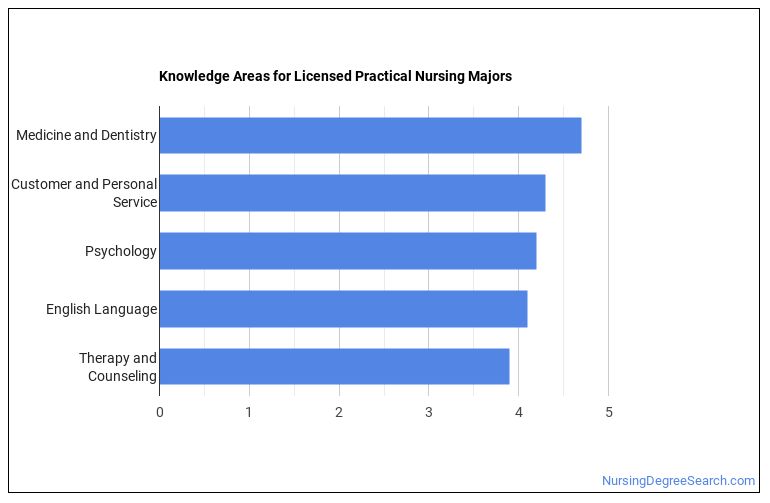
- Medicine and Dentistry - Knowledge of the information and techniques needed to diagnose and treat human injuries, diseases, and deformities. This includes symptoms, treatment alternatives, drug properties and interactions, and preventive health-care measures.
- Customer and Personal Service - Knowledge of principles and processes for providing customer and personal services. This includes customer needs assessment, meeting quality standards for services, and evaluation of customer satisfaction.
- Psychology - Knowledge of human behavior and performance; individual differences in ability, personality, and interests; learning and motivation; psychological research methods; and the assessment and treatment of behavioral and affective disorders.
- English Language - Knowledge of the structure and content of the English language including the meaning and spelling of words, rules of composition, and grammar.
- Therapy and Counseling - Knowledge of principles, methods, and procedures for diagnosis, treatment, and rehabilitation of physical and mental dysfunctions, and for career counseling and guidance.
Skills for Licensed Practical/Vocational Nurse Training Majors
When studying licensed practical/vocational nurse training, you’ll learn many skills that will help you be successful in a wide range of jobs - even those that do not require a degree in the field. The following is a list of some of the most common skills needed for careers associated with this major:
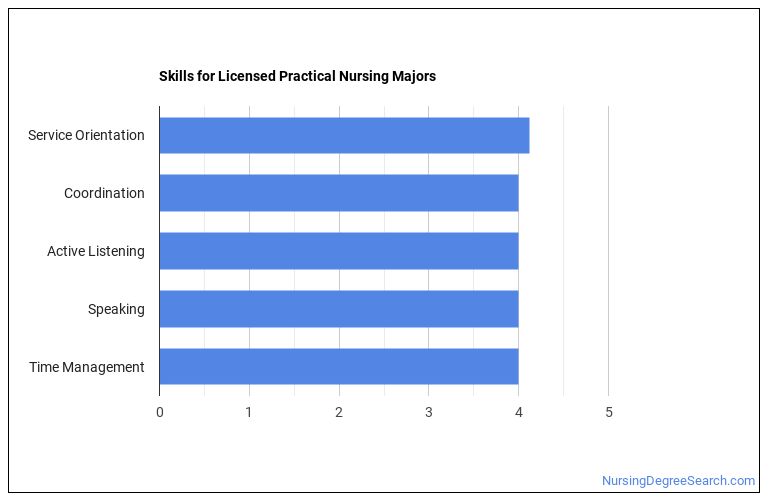
- Service Orientation - Actively looking for ways to help people.
- Reading Comprehension - Understanding written sentences and paragraphs in work related documents.
- Active Listening - Giving full attention to what other people are saying, taking time to understand the points being made, asking questions as appropriate, and not interrupting at inappropriate times.
- Speaking - Talking to others to convey information effectively.
- Monitoring - Monitoring/Assessing performance of yourself, other individuals, or organizations to make improvements or take corrective action.
Abilities for Licensed Practical/Vocational Nurse Training Majors
Licensed Practical/Vocational Nurse Training majors often go into careers where the following abilities are vital:
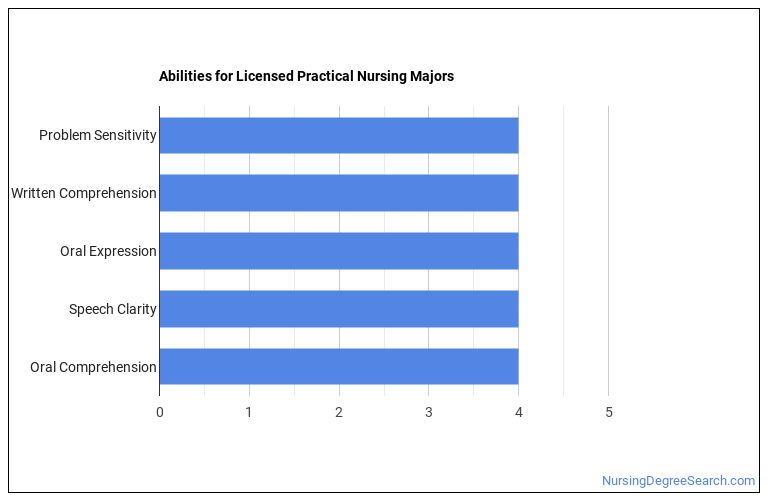
- Oral Comprehension - The ability to listen to and understand information and ideas presented through spoken words and sentences.
- Written Comprehension - The ability to read and understand information and ideas presented in writing.
- Oral Expression - The ability to communicate information and ideas in speaking so others will understand.
- Problem Sensitivity - The ability to tell when something is wrong or is likely to go wrong. It does not involve solving the problem, only recognizing there is a problem.
- Speech Clarity - The ability to speak clearly so others can understand you.
What Can You Do With a Licensed Practical/Vocational Nurse Training Major?
People with a licensed practical/vocational nurse training degree often go into the following careers:
| Job Title | Job Growth Rate | Median Salary |
|---|---|---|
| Licensed Practical and Licensed Vocational Nurses | 12.3% | $46,240 |
Who Is Getting a Bachelor’s Degree in Licensed Practical/Vocational Nurse Training?
Racial-Ethnic Diversity
At the countrywide level, the racial-ethnic distribution of licensed practical/vocational nurse training majors is as follows:
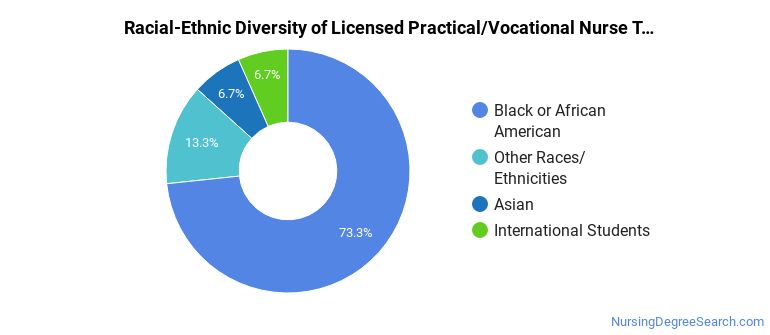
| Race/Ethnicity | Number of Grads |
|---|---|
| Asian | 0 |
| Black or African American | 7 |
| Hispanic or Latino | 1 |
| White | 0 |
| International Students | 3 |
| Other Races/Ethnicities | 0 |
Geographic Diversity
Americans aren’t the only ones with an interest in Licensed Practical/Vocational Nurse Training. About 27.3% of those with this major are international students.
Amount of Education Required for Careers Related to Licensed Practical/Vocational Nurse Training
Some careers associated with licensed practical/vocational nurse training require an advanced degree while some may not even require a bachelor’s. Whatever the case may be, pursuing more education usually means that more career options will be available to you.
Find out what the typical degree level is for licensed practical/vocational nurse training careers below.
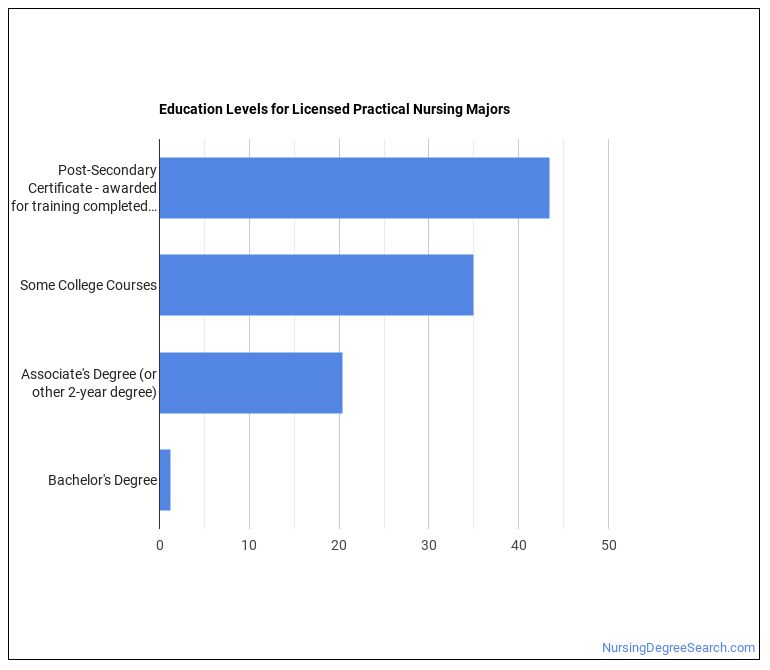
| Education Level | Percentage of Workers |
|---|---|
| Post-Secondary Certificate - awarded for training completed after high school (for example, in agriculture or natural resources, computer services, personal or culinary services, engineering technologies, healthcare, construction trades, mechanic and repair technologies, or precision production) | 43.4% |
| Some College Courses | 35.0% |
| Associate’s Degree (or other 2-year degree) | 20.3% |
| Bachelor’s Degree | 1.3% |
Online Licensed Practical/Vocational Nurse Training Programs
The following table lists the number of programs by degree level, along with how many schools offered online courses in the field.
| Degree Level | Colleges Offering Programs | Colleges Offering Online Classes |
|---|---|---|
| Certificate (Less Than 1 Year) | 0 | 0 |
| Certificate (1-2 years) | 968 | 3 |
| Certificate (2-4 Years) | 49 | 0 |
| Associate’s Degree | 96 | 2 |
| Bachelor’s Degree | 1 | 1 |
| Post-Baccalaureate | 0 | 0 |
| Master’s Degree | 0 | 0 |
| Post-Master’s | 1 | 0 |
| Doctor’s Degree (Research) | 0 | 0 |
| Doctor’s Degree (Professional Practice) | 0 | 0 |
| Doctor’s Degree (Other) | 0 | 0 |
Explore Major by State
Alabama
California
District of Columbia
Idaho
Kansas
Maryland
Mississippi
Nevada
New York
Oklahoma
South Carolina
Utah
West Virginia
Alaska
Colorado
Florida
Illinois
Kentucky
Massachusetts
Missouri
New Hampshire
North Carolina
Oregon
South Dakota
Vermont
Wisconsin
Majors Related to Licensed Practical/Vocational Nurse Training
You may also be interested in one of the following majors related to licensed practical/vocational nurse training.
| Major | Number of Grads |
|---|---|
| Nursing Assistant/Aide and Patient Care Assistant/Aide | 38,097 |
| Other Practical Nursing, Vocational Nursing and Nursing Assistants | 4,826 |
References
*The racial-ethnic minorities count is calculated by taking the total number of students and subtracting white students, international students, and students whose race/ethnicity was unknown. This number is then divided by the total number of students at the school to obtain the racial-ethnic minorities percentage.
- College Factual
- College Scorecard
- National Center for Education Statistics
- O*NET Online
- U.S. Bureau of Labor Statistics
- Usual Weekly Earnings of Wage and Salary Workers First Quarter 2020
More about our data sources and methodologies.
